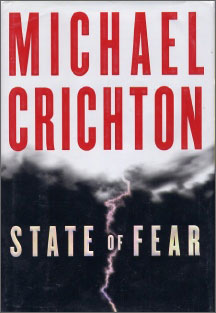 |
 Michael Crichton
Michael Crichton
State of Fear
Reviewed by: Rick Kleffel © 2006
HarperCollins
US First Edition Hardcover
ISBN 0-066-21413-0
603 Pages; $27.95
Publication Date: 00-00-2004
Date Reviewed: 02-07-06
Index:
General Fiction Science Fiction
With all the faux controversy generated around the topic of global warming, you might be tempted to believe that 'State of Fear', Michael Crichton's latest techno-thriller, is based on the premise that the world is flat and therefore unlikely to grow warm. There are certainly problems with the book, but the science is not necessarily one of them. Crichton brings a hard-nosed and quite potentially offensive-to-true-believers skeptical viewpoint to bear on all the science that supports the idea of global warming. He's not subtle about it either. Still, readers may find his contrarian viewpoint rather bracing, even if they consider the science itself to be dodgy at best and flat-out wrong at worst. But it's no reason to fret really. What readers should fear in 'State of Fear' is the state of Crichton's characters. If the world is flat, so are his characters.
'State of Fear' begins as a foolish grad student is seduced into revealing Secrets That Should Be Concealed to an Exotic Seductress Who Should Be Resisted. But it's some fifty pages before we really meet the main characters here, Peter Evans and Sarah Jones. Peter is a dweeby lawyer and Sarah is the drop-dead beautiful daughter of a powerful politician and a fashion model. Working for a multi-bazillionaire, they stumble onto and into a conspiracy by miraculously competent environmentalists. Readers are asked to wonder what these guys are doing with industrial scale cavitations devices, once it's explained what an industrial scale cavitations device is.
'State of Fear' finds Crichton combating a fierce enemy, the polemic novel. From front to back, 'State of Fear' exists to make the point that climate science should be doubted. Polemic novels can be bracing and really fun in the right hands. But what happens here is an example of why they are so difficult to write. First and foremost, Crichton's characters in 'State of Fear' are one and all paper-thin clichés. From the idiot actor who simply mouths a supposed environmental party line to the government spook who simply mouths Crichton's contrarian lines, every character here clearly exists either to move action, present a position or supply information. They never achieve any inner life for the reader, and they’re so uninteresting that readers might secretly hope they all fall into a pit. Or openly hope. Where's that pit?
The plot is also utterly, transparently by the numbers, and this too detracts from the enjoyability. We know who is doing what, why they’re doing it, and we can guess the outcome without a lot of effort. Crichton does supply a sort of standard-issue thriller propulsion to keep the pages turning, assuming you’re not tearing them out in frustration at his take on climate science. But don’t look for the spark of invention and surprise that made his early novels, like 'The Andromeda Strain' and 'Binary', more involving.
What that leaves is the science in Crichton's science fiction, and it's a decidedly mixed bag. Crichton excavates some pretty neat techno-toys in 'State of Fear'. Reading about them, you'll get that caught-in-the-headlines feel. The flip side is that cavitations gear becomes a high point. It's welcome, considering the company you'll be keeping in terms of the characters.
Crichton's damn-the-evidence, contrarian viewpoint is really rather a breath of fresh air. It may prove, in the long run, to be utterly wrong and wrong-headed, but it's pretty fun to read, and is the spark of polemic life in this novel. You can see why Crichton made the decision to write what he did, even as you regret the decision to read it. That's because Crichton ups the ante for info-dumps in 'State of Fear', offering readers undigested and nearly indigestible chunks of data in the form of graphs, charts and extensive notes that refer to real studies. Near the end, when another mouthpiece scientist gets a brief walk-on to state one of the book's many theses, it's again rather enjoyable until you begin to feel as if you've been buttonholed by the pretentious party bore, the guy that everybody else knew to stay away from.
Crichton rounds out the novel with nearly forty pages of non-fiction, from an Author's Message to an essay on "Why Politicized Science Is Dangerous". Readers who agree with Crichton's take on everything will find these particularly delightful and those who don’t will find them even more aggravating than the novel. There are pages of notes to the text, and a bibliography, probably a dangerous sign even in a science fiction novel.
'State of Fear' is a novel that derives what power it has from Crichton's willingness to confront accepted belief with skepticism. Whether he is proved to be utterly right, utterly wrong or simply not applicable, it's just fun to see beliefs questioned. But the deep problem at the heart of all this skepticism is that it requires a more fervent belief than that which it seeks to supplant. In the end, a novel that takes sides as stridently as 'State of Fear' is going to be loved by one side and hated by the other. You probably already know which side you’re on, and thus how you feel about the novel. Even the most commonly accepted facts seem open to dispute, given that there is in fact, a Flat Earth Society. But even flat-earthers are unlikely to enjoy flat characters.
|
 |
